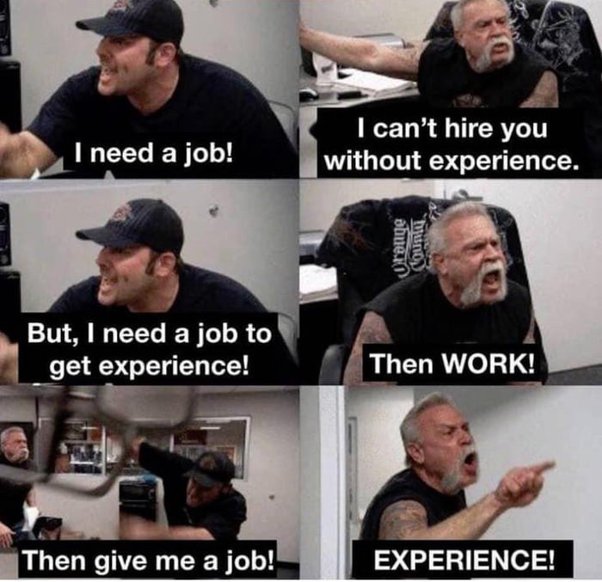Career Module Summary
What employers want:
In this particular order:
- Soft skills
- Can you think, talk, collaborate, ...
- Culture fit
- Do I see myself working with you easily?
- Are your values aligned with the rest of the team?
- This video explains it
- Technical skills: can you do the job?
You're amazing on all fronts, but ...
Employers don't know that, do they?
Getting a Job Requires
1. Networking
- Employers (at small startups) hate posting jobs: expensive, time-consuming, risk of hiring a crazy person
- They hire from their network first
- So 80%-90% of jobs are never posted anywhere,
- They are filled through the network
- "Hmmm... do I know anyone for this position?"
- "Hey friend, do you know anyone for this position?"
Which means that you have to network:
- Attend every tech-related event: hackathons, meetups, networking, talks, ...
- Source for events in previous page
Don't try to sell, pitch, or impress. Just be yourself. Be casual.
Ask questions, listen, and talk about the things you enjoy talking about.
Stop hanging out with other students at events. They can't help you.
People you meet will forget you in a week, so you have to stay in their minds:
- Add people you meet on LinkedIn
- Fix your linkedin profile (follow this guide)
- Post updates to your LinkedIn
- Pick a frequency and stick to it; Consistency > Intensity
- Once a month (easy) to once a week (very hard)
- Examples:
- "Here's a figma design of the project I have in mind"
- "Today, I attend this event (plus photos) and it was fun"
- "Just finished a project on React, check it out here"
- "Here's a video demo of that project I did"
- "It's been a difficult journey, but this thing has helped me a lot recently..."
- Create genuine content: things you actually enjoy talking about
- Always attach graphics, photos, videos
Most people don't. My advice:
Post content you are genuinely excited about and you may start enjoying it.
You are not looking for likes, or comments, or sympathy.
Your only goal is for the people who met you to remember you and enjoy seeing your journey.
2. Portfolio
Ok, so you got the attention of an employer online or in person.
The next thing they'll do is check your portfolio.

The best portfolios look like this:
- Has some real external projects, e.g. an app for XYZ org
- Projects are complex
- Projects look amazing (great design)
- An active Github
Where does your portfolio live?
- LinkedIn is good enough (the experience/volunteer/projects sections)
- Github obviously
- Optionally: create a portfolio website
3. Interviews
Let Sahand know when you have an interview and he'll help you prepare.
A very important note about confidence
You will be inclined to tell people "I am a student" at events, on linkedin, on resume. Which is fine and true.
But before you start applying and looking for jobs, I shall ask you:
If you don't believe you are a software developer, how do you expect someone to give you $70k to be one?
The confidence to call yourself a software developer, and more importantly to actually be one, does not come out of thin air. It comes from:
- Writing more and more code
- Contributing to more and more complex projects
- Meeting more and more of your peers
Then some day you'll wake up and feel:
Wait wait... I'm actually doing as complicated things as the people I meet and admire. Maybe I am a software developer now.
This confidence will heavily impact:
- how you network with others as peers vs. employer/job-seeker
- your linkedin and resume
- and your interviews
Summary:
These are your tasks for the next 6 months:
- Network, attend every event possible, meet new people
- Keep adding people to your LinkedIn
- Post updates to your LinkedIn
- Work on interesting complex beautiful projects
- Keep your LinkedIn/Github profile update-to-date with all your adventures